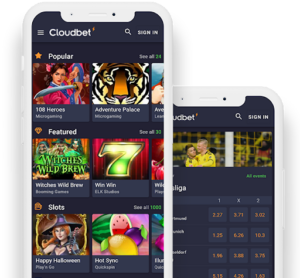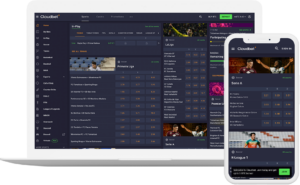Although this is posted under “New at Cloudbet”, it is essential to us that as we look ahead to what we can do to improve, we do so without forgetting who we are and where we came from. At it’s heart, Cloudbet’s raison d’etre is to provide our players the best possible bitcoin betting experience. And we do that by remaining close to the crypto community, our players, listening to both, and ultimately, delivering what you ask for.
This chat with Crypto Fireside takes us back to the beginning and how it all started.
Crypto Fireside: Hello! Who are you and what do you do?
Leandro X: Hi, I’m Leandro. My team and I created Cloudbet, one of the world’s oldest bitcoin betting sites. We operate an online sportsbook and casino, much like many other Internet betting operators, with the one major and obvious differentiator being that our deposits and withdrawals are all in cryptocurrency. All bets are placed in one of 30+ coins that we support.
I say we’re the “oldest” which makes us sound geriatric, but that just speaks to the relative youth of cryptocurrencies and all their related services and industries. In reality, Cloudbet officially launched in October 2013 – that’s when we took our first bet. Incidentally, that bet was on K-League soccer in South Korea and it was worth 0.12 bitcoin – just $24 at the time! Like bitcoin, we’ve come a long way since then, we’ve taken millions of bets and we’ve now got more than 200,000 registered customers all around the world.

Cloudbet application on Mobile and Tablet

CF: What’s your backstory, how did Cloudbet come to be?
LX: This story starts with abject curiosity and diving into a bitcoin Internet rabbit hole at some point in 2012, which led us to the realisation that bitcoin can solve so many problems and challenges that exist in payments for gambling.
So, rewind to 2012. We were involved with gaming sites, with this growing curiosity in bitcoin. We installed the Bitcoin Core client, which did everything back then: It was your wallet, it connected you to all the other nodes, it was the application you would mine from. So because of it, back then, you would inevitably get exposure to all the pieces of it. We set up mining rigs on our laptops.
As we dove deeper and deeper into it, it became clear to us that this was the most impressive accomplishment of technology and economics of our generation. The technology pieces, this truly decentralized nature, this true peer-to-peer ledger, this entirely trustless way of sharing information or moving things of value, was really cool.
The other part that was really cool was the deflationary nature of the asset. The economic parts are almost more interesting than the technological parts. Either way, it’s a very cool marriage: This was such an achievement of technology and economics, of human ingenuity, that we wanted to build a business in and around bitcoin. It wasn’t so much the gaming side, it was the bitcoin side, the crypto side: This is fascinating, what can we build? Our experience at the time was mostly in gaming, so gaming made sense. At the time, as interesting and as fascinating as we found bitcoin, there was no utility to it, you couldn’t really do anything with it but we figured that in gaming, we can actually do something with it.
To understand that, you need to understand the nature of online payments, which generally means buying stuff with a credit card. The way a credit card is designed is what we call a “pull” payment. You make your transaction and the merchant pulls money out of your credit card acquirer, and your acquirer will pull money out of your account. So money is basically pulled from you. If you made a transaction with someone who didn’t deliver what you bought, you can raise an objection or a fraud complaint, and the transaction gets cancelled. The way that you’re protected is because you’ve stopped them from pulling that money. In gaming, that meant a lot of issues with fraud, because people would maliciously and fraudulently claim that these charges weren’t authorised, when in fact they were, so the funds were blocked and weren’t able to be pulled out of your account.
Bitcoin is totally different. It’s what you call a “push” payment. Rather than having the funds pulled out of my account, I have to actively push it to you, so I don’t have any recourse to recover it, rather you’re the one that has control. The balance of power has shifted a little bit. It means that from an operator’s perspective, you don’t have to deal with payment fraud. You don’t have to deal with chargebacks, those sorts of things, and that’s cool. So it solves a lot of issues for gaming operators who receive and send money. They can do it in a way now that is way cheaper, you can transact from anywhere instantly at extremely low cost, and with zero risks of fraud or chargeback.
CF: How did you know there was a demand for your product?
LX: There was no market research, and we didn’t test the market before seeking funding and building the first product. What did exist at that time were a couple of bitcoin sites that were doing very well in betting, which we took as strong indications of demand in the market.
One was satoshidice.com and they did on-chain betting, a simple dice game. They would have a bunch of different bitcoin wallet addresses and each address would have a different likelihood of winning and a different associated payout. You would send bitcoin to an address, and they would roll a dice for you and if you won, you would get money back. Their trade volumes were published, you could see on the blockchain everything that was being sent to these addresses and everything sent from those addresses. At one point, they were the single largest transactor of bitcoin in the world and the product could not have been more simple.
There was another site called Anonibet.com. They were doing sports betting in bitcoin, the product itself was extremely rudimentary but because you can see what’s on the blockchain, they were clearly doing some trade volume. So in a sense, this was our market research, because we saw these two sites, particularly Satoshi Dice, which were having extreme success, so there was a belief that we could make it work and there would be demand for it.
CF: Describe the process of launching Cloudbet.
LX: The path we took only needed a small amount of money and we built it with two people. We went out and raised funds from a small group of investors. Even that wasn’t complicated, there was no detailed deck or anything, just a group of people willing to believe what we were telling them in the pub. But as far as the team itself, there were only two people on the day we launched. From the time we went live, we had instant cashflow. We broke even in a matter of months. In terms of validating investment, that was pretty clear. We then invested more and grew the team, mostly in engineering. Even today, we’re mostly engineering.
So in October 2013, there was a Bitcointalk post in which we announced ourselves to the community, or introduced ourselves to the community. We started taking customers, we started taking real bets and we took it from there.
The customers arrived pretty quickly because we were authentic in our communications. We were asking for feedback, we built a product that clearly the community wanted. It wasn’t 100,000 customers from day one, but it was a good, steady inflow from the beginning, from the first announcement we posted in the forums.
The first peak was in the build-up to the World Cup in 2014. That’s when we saw a substantial increase in customers. And then we saw another boom in the crypto price rally in 2017. More mainstream interest, more Googling of bitcoin, more and more individuals understanding and buying it and therefore being able to bet with an asset that still to this day has very little other utility to it.
A screenshot of Cloudbet’s website from February 2014. It shows the homepage from a desktop application with some sports images, video, signup and login options.

Screenshot from February 2014
CF: Since launch, what has worked to attract and retain customers/users?
LX: Right from the start, we’ve focused on trying to give customers what they want. That sounds like marketing 101 stuff, but it’s the truth and you have to live by that mantra if you’re running a consumer-facing platform and building tech for a customer base. Understand who the customer is and do your best to delight them. That’s what we try to do, anyway.
In the early days, a lot of that feedback came from engaging with the Bitcointalk community. As mentioned earlier, we announced our launch on Bitcointalk, and we used the Cloudbet thread on that forum to seek feedback and input into what we were producing. Crypto aficionados are very community-minded and focused, there’s a real “us versus the world” mentality, which resonates easily with us. So because of that community push, you have to be present where customers or potential customers will be, whether it’s Bitcointalk or Reddit or Discord or wherever. You have to engage with them and listen to what they want, and then you have to follow through and build it.
For example, last year, our customers were asking for esports events, and we gave them a whole new vertical that we continue to improve and evolve. Earlier this year, we ran a survey of almost 10,000 of our most active customers to find out what they wanted. They told us: DOGE, DASH, and Litecoin. So we gave them: DOGE, DASH, and Litecoin.
CF: What are you working on right now and what does the future look like for Cloudbet?
LX: Last year was a bit of a milestone year, even with the world gripped by a global pandemic. We kept pushing out new features aggressively, including a new esports vertical, politics betting, on-site coin purchases (by integrating MoonPay), and the Cloudbet Arcade (with classic provably fair games). We’ve added 9 new coins in the last year-and-a-half, including the three mentioned above.
We launched an Argentine service in December and a German site just last week (June 4). We have plans for more new markets and new coins, but we can’t share any details at this point.
For casino, we’re currently working on a huge expansion and improvement in the casino product in the way that we reward customers so that they will never have any reason to play anywhere else.
Speaking very broadly, for sports: We’re developing technologies that allow us to take the largest bets that anyone in the world has ever taken. We’re providing a platform for a customer to not need to go anywhere else for the bets that they want. If you want larger bets, you can have it with us. You want better pricing, you can have it with us. If you want niche markets, you can have them with us. That’s especially relevant for the VIP customer. If you bet any substantial amount of money on sports, then you should do it with us and not anyone else.
CF: Through starting the project, have you learned anything particularly helpful or advantageous?
LX: In the very early stages, there’s not much we would have done differently. There are things we could have done differently a little later, like when competitors entered, we were too complacent, maybe not aggressive or ruthless enough in the way we grabbed land. We should have had products in other languages, non-English language markets, much, much sooner. That’s one thing for sure. We’ve seen our competitors effectively be first, despite coming to the world a year or two after us, by going into markets that we weren’t in before we did.
CF: What have been the most influential books, podcasts, or other resources on your journey?
LX: For a crypto entrepreneur, you have to start by reading the Bitcoin Whitepaper. It’s really easy to read, very well written. Very easy non-technical read as well, so definitely read that. “Mastering Bitcoin” is also a good one, by Andreas Antonopolous. Also very easy to read, but there’s a bunch of technical stuff in there, so you won’t read it in one sitting.
Other must-read books: The Lean Start-Up. Mastering the Rockefeller Habits. Design of Everyday Things. The Alliance by Reed Hoffman.
CF: What advice would you give to creators, entrepreneurs, and developers who want to get started or are just starting out?
LX: Be humble and read. Read everything you can get your hands on. The amount of study and research you have to do now to get up to speed with what’s happening is so much more than what it was back then. You’ve got a lot to learn before you can dip your toes.
Understand human needs. The technology is interesting and important but the way in which humans use it is a key part. What drove us back then was designing for a human need, building for human engagement and interaction, the things that humans craved. That’s worked really well for us so if you’re coming in now, think about what is it that people want, what is it that people can be emotional about, what is it that people will really feel a personal connection to. In gambling, it’s so inherently connected to human emotion, the highs and the lows you experience are so emotive, that you can’t gamble and not have some kind of emotional experience, that kind of defeats the whole purpose.
Don’t start a business that you’re not passionate about. Make sure that it’s your passion, this thing that you will live and die by, breathe every moment of every day because that’s what it takes. It can consume your life. You should have a personal connection with what you build and you should care about how it fits with the world and the people who would use it.
Get into the lab and work on your product. Don’t get so caught up in going to every event and networking event and every crypto-type thing. Go spend time building stuff you want to build. If you’re not an engineer, then product design, whatever it is you have to do, don’t just spend time attending events.
CF: Where do you see the crypto space going in the next 5 to 10 years?
LX: The technology in the market is just going to get so much more mature and interesting. The benefits that crypto unlocks for betting over fiat currency or traditional payment methods, right now, we’re seeing them in cheaper costs but we think we’re going to start seeing them in really profound ways. All these creative ways that we can’t dream up right now, like utility or functionality that’s unlocked because of crypto, because of blockchain, because of the cost savings, because of all of that, we will see a betting product like we’ve never seen before. Very compelling stuff that will engage players in ways that they’ve never been engaged before.
Now we’re seeing new activity, new betting propositions, prediction markets have become really interesting, derivative products have become unlocked, even more options markets. Different types of instruments become relevant. Even things like esports. When you’re intersecting electronic games with electronic betting with good technology, it’s quite exciting. We don’t know what it will look like, but we’re pretty sure it will be very different from what we have now.
CF: Where can we go to learn more?
LX: Cloudbet.com for all your crypto betting needs!
Bitcointalk forum (where it all began almost 8 years ago)
Check out our Blog for educational articles, betting strategies and the latest promotions.
Twitter: @Cloudbet
Discord: https://discord.gg/mpFcHWW
Telegram: We run groups for our Canadian, German and Australian customers.
CF: Thank you, Leandro!







